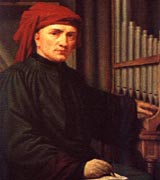
Recommended Cd's
It is hard to over estimate the importance of this composer to the history of music. He is considered to be the father of both the motet and the mass. Unlike Dufay's isorhythmic motets, which often name a patron or particular occasion, Josquin's motets make no such references and are thus difficult to date precisely.
Josquin's most important motets historically are perhaps those based on texts for which no conventions existed, poetry of the Old Testament, often quoting scripture verbatim. Psalms were used often for their particular relevance to any given occasion. He was the first composer to use psalms, thus displacing age old traditions of cantus firmus techniques with word play and imitation as a means of composition. This was a musical adaptation of significant proportions. This technique meant that the words of the psalm or scripture needed to flow naturally with the rhythms and meter of the music. Single voice singing now acquired new rhetorical possibilities and received even greater stress. The dramatic change in texture produced by juxtaposing polyphony and homophony highlighted a new phrase of text and put its meaning in to a more cogent musical context. As was mentioned in regard to the decline of the isorhythmic motet, audiences were demanding a clear and consistent relationship between words and music.
Josquin also began to explore more fully the illustration and symbolization of verbal conceits by musical gestures.This was an experiment never attempted by his predecessors, and the impact of which was felt beyond the music of the church particularly in secular music. Polyphony was not the exclusive domain of the sacred, secular music also adapted many of the techniques Josquin provided By the time of Josquin's death in 1521, the motet as a genre appears to have been largely defined, and the musical language associated with it until at least the end of the16th century was fully formed in all its essentials. .However Josquin's attention to musical rhetoric was not shared to an equal degree by all his immediate and younger contemporaries. Others, such as Gombert, emphasized more the rational ordering of the musical structure rather than rhetorical gestures derived from verbal meanings. Gombert showed the influence of the earlier Netherlanders in his preference for full contrapuntal textures. French composers of the next generation failed, for the most part to follow Josquin's example. None the less, the impact on future generations was immense.